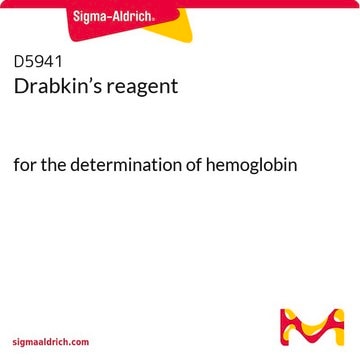H2500
Hemoglobin from bovine blood
lyophilized powder
Synonym(s):
Bovine hemoglobin, Hb, Methemoglobin
About This Item
Recommended Products
biological source
bovine blood
Quality Level
form
lyophilized powder
mol wt
Mr ~64500
technique(s)
MALDI-TOF: suitable
storage temp.
2-8°C
Gene Information
cow ... HBA1(281221) , HBB(280813) , HBE2(513240) , HBE4(513108) , HBG(511735) , alpha globin(512439)
Looking for similar products? Visit Product Comparison Guide
General description
Application
- standard curve generation for the quantification intraparenchymal hemorrhage and parenchymal hemorrhage in spinal cord homogenate using Drabkin′s assay, Quadrupole-Ion Mobility-Time-of-Flight mass spectrometery
- the generation of molecularly imprinted polymers (MIPs) to mimic high molecular-weight polyethylene glycol (PEG) in crystallization studies
Biochem/physiol Actions
Caution
Storage Class Code
11 - Combustible Solids
WGK
WGK 3
Flash Point(F)
Not applicable
Flash Point(C)
Not applicable
Personal Protective Equipment
Certificates of Analysis (COA)
Search for Certificates of Analysis (COA) by entering the products Lot/Batch Number. Lot and Batch Numbers can be found on a product’s label following the words ‘Lot’ or ‘Batch’.
Already Own This Product?
Find documentation for the products that you have recently purchased in the Document Library.
Customers Also Viewed
Our team of scientists has experience in all areas of research including Life Science, Material Science, Chemical Synthesis, Chromatography, Analytical and many others.
Contact Technical Service








